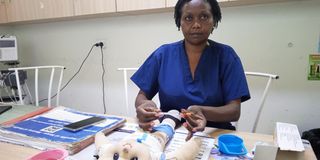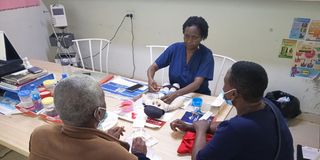Shujaa Gladys Chesire: A nurse with a heart for diabetes patients

Gladys Chesire demonstrates how to inject insulin at Nakuru teaching ad referral hospital on October 17, 2024.
As I waited at the diabetic centre of excellence, two women approached, and without introduction, I knew one of them was the person I was waiting for.
Her warm smile as she greeted me gave her away even before she introduced herself.
Gladys Chesire greeted me and asked for a moment before we started the interview.
Before long, three patients arrived, and as I sat at the back, she calmly addressed them, asking if they had been referred to the centre and informing them they would proceed to the education room for further instructions.
When she returned, I wasted no time in asking her why she loves her job.
She paused, looked up thoughtfully, and responded, "Diabetes is often seen as a death sentence. But the greatest joy for me is seeing children with diabetes grow into productive adults, despite the challenges of daily injections."

Gladys Chesire trains diabetes patients on management and care of a patients at Nakuru teaching and referral hospital on October 17, 2024.
Chesire, a diabetes care and management nurse at Nakuru Teaching and Referral Hospital, has been a nurse for 19 years.
She shifted to diabetic care in 2013 and considers it her most fulfilling role, especially her work with wound care.
"People with diabetes, develop wounds that are slow to heal, with some being life-threatening. To some, these wounds are scary, but I love my work. I do this with passion because we need to save a life and most importantly self-esteem and confidence of the patients," she explains
Chesire expresses pride in the growth of the centre, which has expanded from one small room, to a fully staffed and equipped facility.
"When I started, it was just me and one doctor, handling about 20 patients a day. Now, we see up to 90 patients daily from Nakuru and beyond. There has also been a significant reduction in the number of patients with wounds and amputations," she notes.
Chesire also pioneered the creation of a diabetic patients' support group, which meets every Thursday.
The group, which started small, has grown so much that additional support groups have been formed in lower-level facilities to ease the burden on the hospital.
"The support group allows patients to encourage and learn from each other, reducing their reliance on the hospital. It helps newly diagnosed patients feel less alone and reduces the mental health challenges that often come with the disease," she says
In addition to her work with the support group, Chesire trains children how to inject themselves with insulin to regulate body sugar levels.
She also documents diabetic patients and does follow-ups to ensure they collect drugs, undergo regular check-ups, and sensitise the community on the disease
Her efforts towards diabetic care have led to her winning awards as Kenya's top nurse in diabetes management and wound care.

A medal Gladys Chesire received for her work in wound care management.
Despite her many accomplishments, Chesire admits that losing a patient, especially one she has worked with for a long time is one of the hardest parts of her job.
To unwind, Chesire enjoys team-building activities and having coffee with friends.
Looking ahead, she hopes for a future where people can live beyond the stereotypes associated with diabetes.
This Mashujaa Day, Chesire celebrates all children living with Type 1 diabetes, acknowledging them as the real heroes and heroines for not letting the disease hold them back from living full, normal lives.
